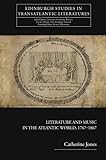Literature and Music in the Atlantic World, 1767-1867 / Catherine Jones.
Material type: TextSeries: Edinburgh Studies in Transatlantic Literatures : ESTLIPublisher: Edinburgh : Edinburgh University Press, [2022]Copyright date: ©2014Description: 1 online resource (288 p.)Content type:
TextSeries: Edinburgh Studies in Transatlantic Literatures : ESTLIPublisher: Edinburgh : Edinburgh University Press, [2022]Copyright date: ©2014Description: 1 online resource (288 p.)Content type: - 9780748684618
- 9780748684625
- American literature -- 1783-1850 -- History and criticism
- American literature -- 19th century -- History and criticism
- American literature -- Colonial period, ca. 1600-1775 -- History and criticism
- American literature -- Revolutionary period, 1775-1783 -- History and criticism
- Music and literature -- United States -- History -- 18th century
- Music and literature -- United States -- History -- 19th century
- Literary Studies
- LITERARY CRITICISM / American / General
- 810.93578 23
- PN56.M87 J66 2014
- online - DeGruyter
- Issued also in print.
| Item type | Current library | Call number | URL | Status | Notes | Barcode | |
|---|---|---|---|---|---|---|---|
 eBook
eBook
|
Biblioteca "Angelicum" Pont. Univ. S.Tommaso d'Aquino Nuvola online | online - DeGruyter (Browse shelf(Opens below)) | Online access | Not for loan (Accesso limitato) | Accesso per gli utenti autorizzati / Access for authorized users | (dgr)9780748684625 |
Frontmatter -- CONTENTS -- List of Illustrations -- Acknowledgements -- Introduction -- 1. Magic Numbers and Persuasive Sound -- 2. Cosmopolitanism and the Nation -- 3. The Life in Music -- 4. Chants Democratic and Native American -- 5. The Musical Sublime -- Notes -- Index
restricted access online access with authorization star
http://purl.org/coar/access_right/c_16ec
Winner of the 2014 British Association for American Studies Book PrizeExplores the interaction of literature and music in the Atlantic world in the age of Enlightenment and RomanticismGBS_insertPreviewButtonPopup(['ISBN:9780748684618','ISBN:9780748684625','ISBN:9780748684649']);This new study looks at the relationship of rhetoric and music in the era's intellectual discourses, texts and performance cultures principally in Europe and North America. Catherine Jones begins by examining the attitudes to music and its performance by leading figures of the American Enlightenment and Revolution, notably Benjamin Franklin and Thomas Jefferson. She also looks at the attempts of Francis Hopkinson, William Billings and others to harness the Orphean power of music so that it should become a progressive force in the creation of a new society. She argues that the association of rhetoric and music that reaches back to classical Antiquity acquired new relevance and underwent new theorisation and practical application in the American Enlightenment in light of revolutionary Atlantic conditions. Jones goes on to consider changes in the relationship of rhetoric and music in the nationalising milieu of the nineteenth century; the connections of literature, music and music theory to changing models of subjectivity; and Romantic appropriations of Enlightenment visions of the public ethical function of music. Key FeaturesThe first study devoted to literature and music in the Atlantic worldIncludes detailed examination of works by canonical and lesser known eighteenth- and nineteenth-century American writers and composersShows the intertwining of European and American cultural formsIntegrates the history of music and the history of subjectivity"
Issued also in print.
Mode of access: Internet via World Wide Web.
In English.
Description based on online resource; title from PDF title page (publisher's Web site, viewed 02. Mrz 2022)


